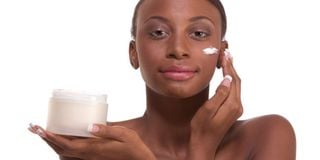Why you need to exfoliate your skin

Skin takes a bit of a beating in the course of its life seeing how it protects you from the elements. PHOTO | FILE
What you need to know:
- The human body is a self-renewal organism that sheds hair and skin on a regular basis.
- Dry skin results from shedding in clumps, which then come off as flakes or a scaly surface to your skin.
- The most common form of exfoliant is the physical kind ranging from body brushing to a homemade maizemeal scrub.
Have there been days when you have moisturised your skin and felt the product was not sinking in? Or you had to rub it in more than usual? That the foundation just kind of...sits there. This is a sure sign that your skin needs to be exfoliated. The human body is a self-renewal organism that sheds hair and skin on a regular basis.
The epidermis, the outside part of your skin, constantly sheds paving the way for new skin. This process actually has a name. It is called desquamation or in normal parlance, natural exfoliation. A process where enzymes in the skin dissolve, allow desmosomes to facilitate the shedding.
Dry skin results from shedding in clumps, which then come off as flakes or a scaly surface to your skin. This shedding process happens all day. If you could get down to the microscopic level of things, then you would see a trail of skin following you like invisible breadcrumbs.
EXFOLIATING
Skin takes a bit of a beating in the course of its life seeing how it protects you from the elements. The question then becomes, do you care for your skin or you just let it do what it does - keep your organs intact.
Exfoliating, the act of buffing away skin cells, is not a particularly complicated process. For a start, there are different types of exfoliation.
- Physical exfoliation, which happens when you use a tool such as a brush to slough off dead cells. Here is where your scrub comes in handy along with its fine granules to abrade the surface of your skin.
- Chemical exfoliation, which tends to involve the most common acids, AHAs and BHAs. These are said to break down the glue that holds cells together helping them come apart and off your body. Small doses are used to exfoliate the face. Natural AHAs can be found in fruit.
-Enzymatic, which are the mildest form of exfoliants. They do exactly what AHAs do, but at a much slower pace. This makes them great for sensitive skin.
MAIZEMEAL SCRUB
The most common form of exfoliant is the physical kind ranging from body brushing to a homemade maizemeal scrub. Physical scrubs should be out of fashion, but they are the easiest to find, and make.
There are countless recipes featuring coconut oil, sugar, salt, coffee grounds all the way to baking soda. These exfoliants leave your skin feeling soft and give you a bit of a glow because of the massage involved in working them.
They also give you the satisfaction of having taken care of yourself. These days, however, physical scrubs suffer from stigma. Take St. Ives, for instance. There was a time no grooming routine was complete without it, till it got pulled from the market for its abrasive nature.
The thing is, no matter what I say here, scrubs will keep on scrubbing. I recommend a once-weekly use. I am well aware there are scrubs which come with instructions to use as a wash, but when you are starting out on a physical exfoliant, start slow.
Massaging it in very softly in gentle circular motions using just your fingertips. Trust me on this. The harder you scrub the more the micro-tears on your skin and the higher the odds of inflaming and irritating your skin. You want to use physical exfoliants with a very light hand on your face. These abrasive scrubs are great for the body though, She is made of sterner stuff.
-Another popular exfoliant is the body brush. Use this before the shower with brisk, circular motions while brushing upwards from your feet to your chest. You can dry brush your body an average of three times a week.
Chemical exfoliants are best applied under the supervision of an aesthetician. They are renowned for treating superficial scarring, wrinkles and hyperpigmentation. Unless you are a skintellectual, do not try this at home.
There is a significant part of exfoliating that we need to talk about - exfoliating your skin means you have to pay greater attention to moisture to keep your skin supple and protect the new layer of skin. Scrubbing is one thing, but what you do after is equally important. Keep in mind that exfoliation can clear clogged pores - which is why there are micro beaded acne facial cleansers.
Exfoliating also helps your skin accelerate shedding and stimulates the production of collagen. Incidentally, retinoids/retinol/Retin-A may cause the skin to peel but it should not be confused with an exfoliant. If your skin peels, the product is too strong and you should go down a level or dilute it by mixing it with your moisturiser.
Your job when it comes to exfoliating is to understand how much of it your skin can take. Note that if you make it a habit to exfoliate, you must make it a habit to wear sunscreen. For a radiant complexion, combine your exfoliant with Vitamin C, especially in serum form. It will amplify your results.




